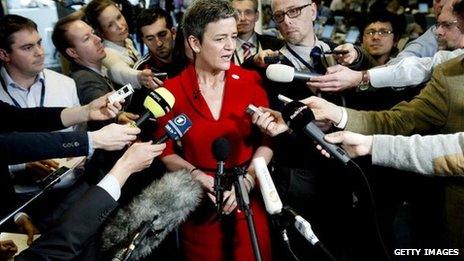Eurozone ministers boost firewall to $1tn
- Published

Denmark's Economy Minister Margrethe Vestager discusses the firewall as the summit begins
Finance ministers in Copenhagen have agreed to increase the size of the eurozone's rescue funds.
Eurozone countriesagreed to boost the joint lending power of the "firewall" from 500bn to 800bn euros ($1.1tn; £667bn), external.
The firewall is the permanent mechanism to bail out troubled eurozone nations.
But in reality, what the eurozone countries are doing is making commitments available earlier that they had already agreed to give.
As Spain and Italy's finances have looked more precarious, investors have been worried about whether the eurozone's firewall could cope with more bailouts.
The new enlarged fund, combined with what the International Monetary Fund has agreed to lend to the eurozone, should be enough to cope with a new crisis, some suggest.
"Including the IMF commitments, this is enough to take care of Italy and Spain for the next three years and that was the point of this exercise," Christoph Weil, senior economist at Commerzbank in Frankfurt, told the BBC.
He added that he did not think Spain and Italy would require bailouts.
Others were less convinced.
"Today's decision is a classic European compromise," said Carsten Brzeski, economist at ING bank in Brussels.
"It was as far as the German government was willing to go and it was the minimum most other eurozone countries were expecting.
"A bigger increase... could have sent a stronger signal and would have been more convincing," he said.
IMF head Christine Lagarde welcomed the move.
"The IMF has long emphasised that enhanced European and global firewalls, together with the implementation of strong policy frameworks, are critical for ending the crisis and securing international financial stability," she said.
'Strategy paid off'
The existing fund - the European Financial Stability Facility (EFSF) - has already been used to rescue the Republic of Ireland and Portugal, and is committed to providing part of Greece's second bailout.
It will have only 200bn euros in remaining lending capacity from the middle of this year, which can only be used for new rescues "in exceptional circumstances".
The European Stability Mechanism (ESM) was originally intended to be a permanent replacement for the EFSF, but now the two will overlap from the middle of this year.
The combined lending of the two funds will be set at a total of 700bn euros.
Including two other loans already made to Greece, the eurozone said the firewall is now above 800bn euros.
"Robust firewalls have been established," the eurozone ministers said. "This comprehensive strategy has paid off and led to a significant improvement of market conditions."
Debate over size
Earlier this week the Organisation for Economic Co-operation and Development - a forum of the world's rich democratic nations - recommended increasing the bailout funds to 1 trillion euros, or about 11% of the eurozone's gross domestic product.
Its head, Angel Gurria, called for ministers to agree what he described as "the mother of all firewalls".
But Germany favoured only a modest increase at the summit of the finance ministers of the 17 nations that use the euro in the Danish capital.
As recently as this week, German Chancellor Angela Merkel said that she would favour only a temporary increase to 700bn euros.
But any increase beyond the 800bn euros that the eurozone agreed would be hard to get through the German parliament, Commerzbank's Mr Weil said.
"There was speculation that the total would be higher, but from the German perspective, this was the maximum they could extract," he added.
Speaking before the meeting, the Republic of Ireland's Michael Noonan said: "If we get to 800 or beyond 800, the denominated amount in dollars... presents a very serious firewall to prevent attacks on Europe."
Many eurozone members, including France, were thought to be in favour of a big increase in order to ensure that larger eurozone countries are not drawn back into the crisis.
Concerns have been raised over Spain, which has failed to cut its borrowing as much as promised, and which faces violent protests against labour market reforms intended to boost its flagging economy.
"I am confident of our capacity to reach an agreement, we will reach a consensus," said French Finance Minister Francois Baroin as he arrived for the talks.
"The right size of the fund depends on how you approach the issue."
Third bailout?
Meanwhile, Greek Prime Minister Lucas Papademos has raised the possibility of a third bailout for his country in an interview with Italian daily Il Sole 24 Ore.
"It cannot be excluded that some financial support may be necessary, but we must try hard to avoid such an outcome," Mr Papademos said.
"Greece will do everything possible to make a third adjustment programme unnecessary.
"Having said that, markets may not be accessible by Greece even if it has implemented fully all measures agreed upon," he said.
A meeting to decide who will be the next head of the Eurogroup - which is the eurozone countries plus the head of the European Central Bank and the Commission - broke up on Friday without a decision.
Jean-Claude Juncker, the current chairman, cancelled a scheduled news conference after becoming angry with the Austrian finance minister Maria Fekter for leaving the meeting early and announcing the decision on the firewall prematurely.
It means a delay - until mid-April - to find out who will replace Mr Juncker and whether Yves Mersch from Luxembourg will take a seat on the ECB board.